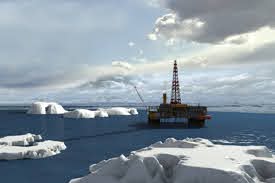by Irina Slav JP Morgan. Citi. Morgan Stanley. Goldman Sachs. All of these banks have announced they will no longer finance oil and gas drilling projects in the Arctic, virtue signaling to environmental groups that have been pressing for the suspension of Arctic drilling altogether
JP Morgan. Citi. Morgan Stanley. Goldman Sachs. All of these banks have announced they will no longer finance oil and gas drilling projects in the Arctic, virtue signaling to environmental groups that have been pressing for the suspension of Arctic drilling altogether. Things recently heated up after the U.S. federal government proposed a new rule that would limit banks’ ability to refuse to finance Arctic drilling unless they can prove that the decision to refuse this financing was based on financial rather than political grounds.
The proposal followed a push from Alaskan legislators who argued that some Native communities in Alaska depended on the oil and gas industry for their livelihoods, with Senator Dan Sullivan saying, "This trend of big banks blackballing Alaska investment is dangerous to Alaska’s economic future,” as quoted by the AP.
Separately, the acting Comptroller of the Currency Brian Brooks noted that banks are supposed to provide access to their services equally to all clients. They could then decide whether or not to support a specific project by a specific client, Brooks noted.
It is in part because of these details that the banks’ public pledge to stop supporting Arctic drilling is little more than virtue signaling. Banks can hardly refuse to fund any oil and gas projects without violating laws. But they wouldn’t refuse to fund non-Arctic oil and gas projects because many of those projects remain too lucrative to shun. Banks, like oil companies, are businesses, and businesses are meant to make a profit.
This idea has been challenged lately, with some arguing that the basics of business need to be rethought in the post-pandemic era. However, for the time being, they remain sound simply because profits ensure the long-term survival of businesses. It is also with a view to profits that most oil companies are far from eager to go drilling in the Arctic National Wildlife Refuge.
The coronavirus pandemic created a huge surplus in oil supplies while pushing demand off a cliff. Oil companies responded the way they always respond to crises: they cut spending, they cut jobs, and they focused on their lowest-risk projects.
Related: EIA Sees WTI Crude Averaging $44 In 2021
Environmental lobbyists argue that Exxon, ConocoPhillips, Chevron, and Hilcorp may find the idea of drilling in the Arctic National Wildlife Refuge attractive simply because they already have operations in Alaska’s North Slope. In fact, a group of these lobbyists is staging a campaign targeting asset managers, insurers, and reinsurers to make them not do businesses with the four companies, Bloomberg reported in September. What is missing from the campaign is evidence of plans by any of these companies to drill in the Arctic National Wildlife Refuge.
For those looking beyond the noise, the reason for this is clear enough: Arctic drilling is a high-cost endeavor. It used to be relatively viable when oil was trading close to—and even above—$100 a barrel. When demand for oil grew steadily every year, it made sense for companies to consider drilling in new regions, including the Alaska National Wildlife Refuge, whose coastal plain could contain as much as 11.8 billion barrels of oil but is also home to hundreds of species and ecosystems that are very vulnerable to human interference.
Those 11.8 billion may have been attractive a decade ago. Now, nobody needs them, which makes drilling in the Arctic largely a moot point. All forecasts about the near, medium, and long term point towards falling oil demand, and the prospect of falling oil demand is not exactly conducive to deciding to spend more money on new drilling, especially in high-cost regions such as the Arctic National Wildlife Refuge.
The anti-Arctic drilling push by environmentalists has achieved one goal, however. It has made the prospect of investing in new drilling in the Arctic even more unappealing for oil companies who have been hard at work on their reputation management lately. Consequently, banks’ decisions to cut funding for Arctic drilling are essentially irrelevant. These decisions won’t hurt oil companies. What will hurt them are banks totally giving up funding the oil and gas industry, which is unlikely to happen anytime soon.
*Irina Slav is a writer for Oilprice.com with over a decade of experience writing on the oil and gas industry.
(Oilprice.com, November 25, 2020)




